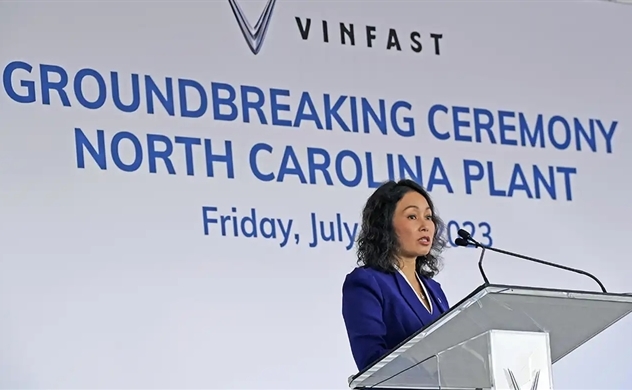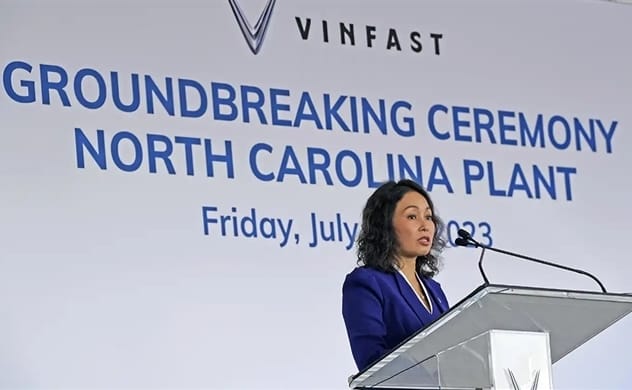
VinFast CEO Thuy Le speaks at the groundbreaking ceremony for the company’s manufacturing plant in the U.S. state of North Carolina on July 28. Photo by Nikkei Asia.
On its first day of trading in the U.S. on Tuesday, the company’s stock opened at $22, more than double the $10 per share agreed with SPAC partner Black Spade Acquisition that had valued VinFast at $23 billion. The shares ended the day at $37.06 giving the EV maker a market capitalization of $85 billion — higher than Ford’s $48 billion and General Motors’ $46 billion.
However, the company’s stock skidded over the next three consecutive trading sessions. On Friday, it closed at $15.40 a share — below Tuesday’s opening price but still comfortably higher than the price during the SPAC merger.
It is important to note that the company’s billionaire founder, Pham Nhat Vuong, controls about 99% of the carmaker, with only a small amount of shares being publicly listed, which makes the stock price volatile.
Analysts asserted that the company can only be truly evaluated when there are more shares to change hands. VinFast has about 2.3 billion outstanding shares, but free float units are only 4.5 million.
“So the volatility is explainable,” Thuy Le, CEO of VinFast, told DealStreetAsia in an interview. “We look to do a follow-on transaction in the next six to nine months, and that will provide more liquidity to the market,” she said.
“We have to execute and deliver. If we can deliver, I think the value of the company is a lot bigger. … Look at how the world is moving from internal combustion engines to EVs. … [For] a company that is able to make it accessible to everyone, the opportunities are enormous,” Le said.
As of Monday’s close, VinFast is valued at around $42 billion — making it the second-most valuable EV player globally, behind only Nasdaq-listed Tesla ($733 billion), according to real-time data on Companiesmarketcap.com.
While the future for VinFast will be defined by various factors, such as investor appetite for the EV sector as well as its ability to sell cars globally, historical trading data suggests a downtrend for EV stocks. Nasdaq-listed Rivian’s valuation, for instance, has plummeted almost 85% to $19.9 billion since its Nasdaq listing in November 2021. The same happened to Asian companies such as Xpeng and Nio.
Nonetheless, listing in the U.S. allows VinFast to “access different pockets of capital” while its operation requires heavy investments, Le said.
Initial costs expanded the company’s loss to $2.1 billion in 2022. In the first quarter of this year, it recorded another net loss of $598.3 million, widening from $411 million in the same period a year earlier. However, Le expected the company to reach break-even in a year or two.
“The rule of thumb in the industry is when sales get to about 200,000 vehicles, you get to break-even. Our cost base is lower, so if we get between 100,000 and 150,000 vehicles a year, we can break even,” she told DealStreetAsia.
Even as VinFast has just started the groundbreaking of its $2 billion U.S.-based factory, Le said it was factored in the company’s financial projection to the break-even point.
“Right now we’re focusing on sales first. The operation in Vietnam is pretty much in break-even,” she added.
The North Carolina factory is a “looking-into-the-future” move, according to the CEO.
The U.S. Inflation Reduction Act of 2022, which promotes clean energy production, imposes certain requirements for EVs to be eligible for its tax incentives. “It’s more relevant for us to have a manufacturing facility in the U.S. to meet those requirements, and our customers can benefit from the tax credits,” Le said.
When VinFast sent its first cars to the global market, reviews from the U.S. were not in favor of the road ahead. In May, the Vietnamese company recalled its first batch of vehicles due to glitches in its screen display and deployed a software update.
“Our vehicles are homologated into the U.S. and EU by meeting the local standards. We don’t have a brand yet. That’s why we need to price competitively, but we don’t compromise on quality,” Le said.
She claimed that VinFast is the only EV producer that offers a whole lineup of vehicles in every segment, from minicars to SUVs. The company has delivered 19,000 of those cars as of June 30 this year.
While Vietnam is currently the largest market for VinFast and it has shipped nearly 3,000 vehicles to North America, the company also is seeking expansion into the entire Southeast Asia market.
Source: Nikkei Asia





